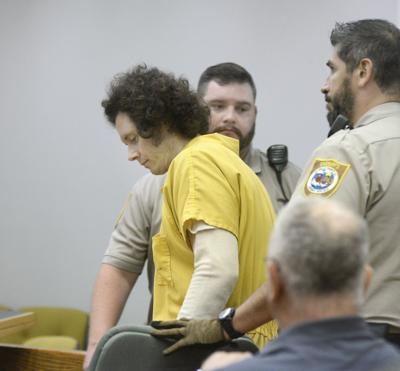After 471 days in jail, then in less than 20 minutes, Donald Fredres, Jr. was sentenced to natural life in prison without parole for the murders of his former in-laws Gregory and Brenda Barnes, both age 62, at their rural home between Sandwich and Sheridan in March 2021.
Outside the courtroom Friday, the tearful mother of Fredres spoke exclusively to WSPY News after the sentencing hearing.
At the hearing inside the LaSalle County Courthouse, public defender Ryan Hamer tried to persuade Judge H. Chris Ryan Jr. for a new trial with six rationales, including and claiming his client was denied a fair trial and the state failed to prove guilt beyond a reasonable doubt.
However, Judge Ryan denied the request.
Later Hamer said Fredres will appeal within the 30 days deadline, which will be heard by the Appellate Court for the Third District in Ottawa.
LaSalle County State's Attorney Todd Martin talked about the request for a new trial and appeal.
When Judge Ryan asked if he wished to address the court, the 38-year old Fredres spoke up clearly and strongly, “no sir.”
That did not surprise Martin.
In the push for a new trial, first Hamer cited the 12-member jury had viewed gruesome photos that made it impossible for Fredres to get a fair trial.
Hamer pointed to two areas, where phone data and blood photos did not lay an appropriate foundation. He also said no forensic evidence linked Fredres to the deaths.
During deliberations, the jury returned to the courtroom, requesting to hear the 911 tape again of Fredres’ ex-wife Jenell Johnson in public, where one emotional member of the audience left the courtroom. Hamer tried to show that could have influenced the jury.
On a different charge, Hamer argued that the firing into a close door is not attempted murder. Fredres had shot into the West Church Street residence of his ex-wife, who was behind the steel outside door.
Meanwhile LaSalle County States’ Attorney Todd Martin countered that the murder photos of the Barnes were at a distance inside the house and were not gruesome. Blood on the carpet and a throw rug came from the blood of Brenda Barnes, required to show where the fired bullet's path ended.
As for a note that Fredres had written and thrown into a Sheridan farm field, he told law enforcement where to find it. Police found it in the exact spot.
Martin argued that phone forensics was just bad evidence for Fredres and his attorney. An experienced investigator testified how to extract information, while Martin said there was no issue at trial that the phone belonged to Fredres.
For the emotional woman that left the courtroom during the replayed 911 call, Martin said the jury’s deliberation took place in private, not the courtroom. He said there is no indication that the jurors ever saw her leave the courtroom, adding the defense said nothing at the time.
Finally, Martin said the state proved beyond a reasonable doubt, saying “you heard the evidence, no doubt, he committed the murder.” On April 29th after a four-day trial, the jury took under two hours to reach the guilty verdict.
Fredres, who lived in a downtown Sandwich apartment, had shot his ex-wife’ parents after they refused to tell him where their daughter was living. After an eight-hour manhunt and community lockdown in Sheridan, Fredres was captured coming out of a farm field near the Sheridan Correctional Center, indicating where the murder weapon could be found in a field wood line. That pistol was recovered.
In the subsequent taped interview with law authorities and without requesting a lawyer, Fredres confessed to the crime.
On Friday, a few members of the Barnes and the Fredres family had provided letters earlier to the judge for his consideration at sentencing. His ex-wife’s letter included what life will be like for her and her three children going forward, informed Martin. The Barnes family did not speak during a victim impact statement opportunity.
They sat in the same row feet apart from the Fredres family and exited separately. Afterwards, the Barnes family declined to comment to the media.
For the attempted murder conviction, Fredres received six years plus another 20 years because a firearm was involved for 26 years total. The state sought 30 years. Sentencing for an aggravated discharge of a firearm was dropped by the judge.
During pre-sentencing, Hamer sought to have the judge consider that Fredres had no priors, no contact with law enforcement as a juvenile, two misdemeanors as an adult with successful supervision, and not likely to reoffend. He said the shooting was out-of-character by Fredres. In addition, he was a high school graduate with a good employment history, and was a productive citizen. According to Hamer, Fredres experienced depression and ADHD, and was abused by a family member as a child. He pointed out, Fredres was affected by his 2013 divorce and loss of two children.
The Illinois Department of Corrections will determine the prison facility for Fredres.
At the conclusion, Judge Ryan said, “Good luck to you Mr. Fredres.”
You can listen to Mark Harrington's radio story by clicking below:

